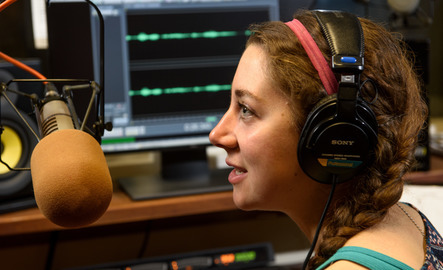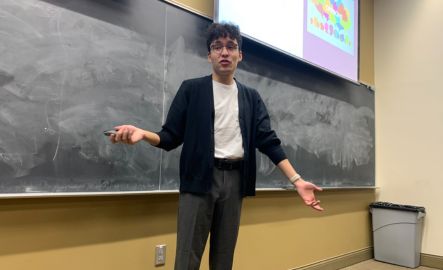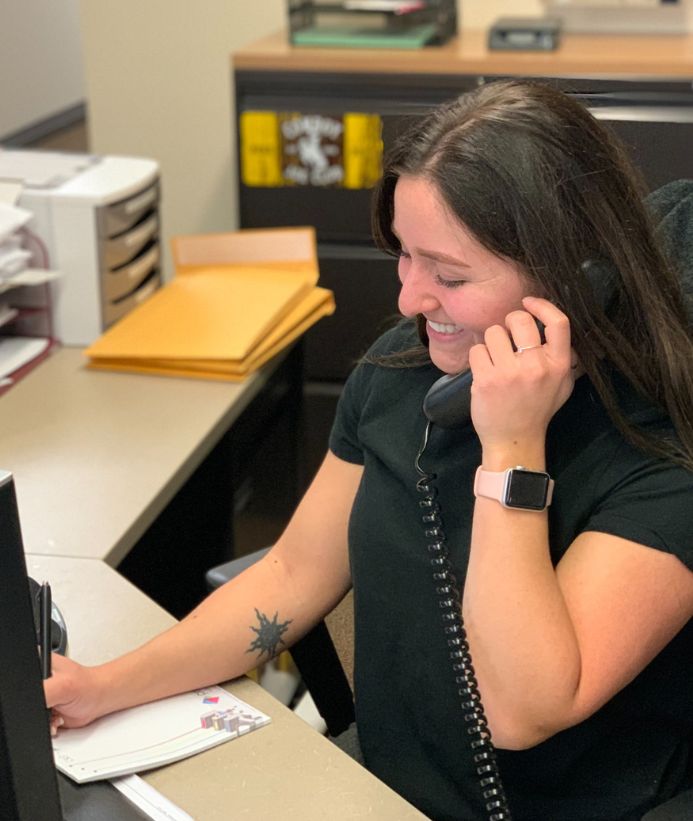About the Communication M.A. Degree Program
Our flexible graduate degree program is designed to provide a supportive environment where you can examine questions that relate to your career goals and interests. Choose from two master’s thesis options:
- A traditional research-based thesis that will advance communication research, bridge communication theories and disciplines and contribute to practical knowledge in communication
- A creative or professional project-based thesis (Plan B) that results in an applied communication plan or product ready for implementation
In UW’s communication master’s degree program, we develop knowledgeable, academically
grounded, independent-thinking communicators, because the world needs more authentic
voices.

Explore the projects that UW communications master's students have completed, and get ideas for your own.
The Department of Communication and Journalism typically offers six to eight graduate assistantships each year, including:
- Public Speaking Teaching Assistantship
- Media Writing Teaching Assistantship
- PR/Marketing Administration for COJO
- Wyoming Debate Union Administrative Assistantship
- Wyoming Debate Union Teaching Assistantship
Graduate assistants get all of tuition and most students fees paid for, and they receive
a stipend for one academic year. They may also be eligible for student health insurance.

Get all the details about the various graduate assistantships available for our students.
What Can You Do With a Communication Master’s Degree?
With a master’s in communication, you can work in PR, marketing, media, corporate communications or nonprofits. Many grads also go on to teach, pursue a Ph.D. or enter law or business school—the options are endless! The degree opens doors to careers that shape messaging, strategy and public engagement across industries.
- Media production
- Public relations or business promotions
- Journalism
- Advertising or sales
- Photography
- Marketing or management
- Web design
- Human relations or diversity training
- Yellowstone National Park
- University of Wyoming
- U.S. Department of Agriculture
- Madwire Technology Company
- Hewlett Packard (HP)
- Civica
Examples of previous thesis and project titles:
- "Falling out of fandom: An analysis of politically outspoken celebrities and its effect on their Millennial and Gen Z fan bases"
- "The Impact of Teacher Clarity and Student Receiver Apprehension on Academic Misconduct"
- "I know Obama, Personally: Examining Parasocial Relationships via the White House Facebook Page"
- "Objectivity in Question: The Ideal of Objectivity and The Display of Adversarialness and Neutrality by Cable News Interviews"
- "Recruit. Tweet. Repeat. An Analysis of Social Media Practices by Men’s Division I Basketball Coaches"
- "An investigation in the Chinese LGBT People’s Online Coming-Out Narratives: Cultural Influences, Cocultural Practices, and Outcomes"
- Public relations and marketing
- Media and broadcasting
- Corporate communications
- Nonprofit and advocacy organizations
- Government and public affairs
- Higher education and research
- Healthcare communication
- Technology and digital media
- Advertising and branding
- Entertainment and sports
Local Impact—National Recognition
UW’s Communication & Journalism (COJO) Department earned national recognition for excellence in public relations. A class project addressing the nationwide shortage of sports officials was featured in the nationally syndicated Referee Magazine, showcasing the program’s real-world impact and innovation.
“The education I received from the University of Wyoming Communication and Journalism Graduate Program was outstanding. I valued the small-class sizes, hands-on learning, and teaching preparation I received in the program. Through its focus on theory and research methods, the program prepared me with foundational skills to pursue a Ph.D degree. Dr. Landreville and other faculty provided me with mentorship to help me grow as a student and scholar. I would absolutely recommend UW to individuals who are seeking a program with all-around great professors, mentorship, and one-on-one learning."
- Isabel Munoz | M.A. in Communication '18 | Ph.D Student/Researcher at Syracuse University School of Information Studies


